Social phobia is not something to be taken lightly for the many people who suffer from an official diagnosis of the condition. Many people never get diagnosed. More than simple shyness, there is a level of discomfort and unfamiliarity around people that leads an individual to stay away from others, isolate themselves, and fear social interaction of any kind. Shyness is more about not feeling relaxed in social settings or in front of people. While both may be debilitating, social phobia (also known as Social Anxiety Disorder or SAD) can derail a person’s life, relationships, and recovery if they are recovering from addiction.
What SAD Looks Like
SAD is unlike other disorders in that it stems from a feeling of not being accepted by society or feeling misunderstood. It is a fear that is intensely driven into the core of a person’s being that presumes negative consequences will happen in ‘social’ situations. They may also feel disapproval when performing, including giving speeches, playing in a recital, or being in a sports competition. Social phobia does not equal mere shyness.
Narcissism Reversed
People who experience narcissistic traits think too highly of themselves or their abilities. This inflated sense of self drives them to look for attention everywhere they go. SAD drives people to keep attention away from them at all costs to avoid performance and social anxiety. The anxiety can become so overwhelming, it results in physiological responses within the body, including:
- Racing heart
- Dizziness
- Headache
- Sweating
- Nausea
Differences Between Shyness and SAD
A feature of shyness and SAD is a social anxiety disorder that debilitates a person’s functioning. Social anxiety can impair a person’s work functioning and create conflict within the family. Social anxiety can impact hobbies and making friends. The lack of confidence means people struggle with assertiveness and often struggle with psychiatric or substance abuse. Shyness, on the other hand, does not result in many of those things, though it may. Clinically speaking, it is not as severe but may lead to social phobias or SAD if not supported by therapy or treatment. Some common treatments are Cognitive Behavioral Therapy (CBT), mindfulness, and social skills training. This will be in addition to substance abuse support, recovery groups, and dual diagnosis treatment. The challenge is to make sure the substance abuse is not driving the SAD more than SAD is driving substance abuse to provide proper treatment. Negative thinking patterns can be another way anxiety builds and keeps a person from engaging socially. This is also common for people who suffer from substance abuse issues that may need some help to treat. It is difficult to treat without professional help, but it is worth doing to find the right help to feel capable of living a life that feels fulfilling and rewarding.
Oceanfront understands the difficulties people face in recovery. You may be facing social anxiety disorder, shyness, difficulty with relationships, or with confidence. We are here to support you no matter where you are on the journey to recover from substance abuse. We are located in beautiful Laguna Beach. Call us to find out how we can help you navigate addiction recovery: 888-981-4295







